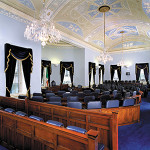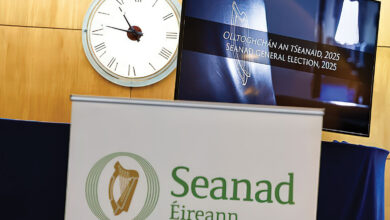Streamlining Seanad Éireann
 The Seanad reform working group has proposed a major restructuring of the second chamber.
The Seanad reform working group has proposed a major restructuring of the second chamber.
In a first for Irish democracy, every citizen (regardless of location) could soon be entitled to vote in a national election due to a significant overhaul of the Seanad. In its current format, most citizens are disenfranchised, the constitutional concept of vocational representation has scarce modern relevance, and there is little clear public understanding of the chamber’s role.
Under the current Seanad electoral system, just over 1,000 citizens (949 local councillors, 166 members of the Dáil and 60 members of the Seanad) have the right to elect over 70 per cent (43 seats) of the House. Another six senators are elected by 150,000 university graduates of Trinity College and the National University of Ireland – three from each respective college. The Seventh Amendment of the Constitution in 1979 provided that the university franchise could be extended by law to include additional third-level graduates. However, no change was ever implemented.
The report has been produced in the wake of the public rejection of the 2013 referendum proposal to abolish the second House. Any new proposals for reform had to remain within current constitutional parameters. The working group tasked with this objective was chaired by NUI Chancellor, and former Fine Gael TD and Senator, Maurice Manning. Also involved were former senators Joe O’Toole, Maurice Hayes and Pat Magner, UCC political scientist Mary C Murphy, former minister Mary O’Rourke, former Constitutional Convention Chair Tom Arnold, and academic and journalist Elaine Byrne.
Taoiseach Enda Kenny has welcomed the report and stated: “It is innovative and radical, and contains some far-reaching recommendations to the way members are elected to the Seanad, and how the Seanad should perform its functions.”
The main recommendations of the report are as follows:
• thirty vocational seats should be filled by popular vote, while elected politicians, both local and national, continue to elect a further 13 (Article 18 requires that 43 seats should be elected on a vocational basis but does not define the electorate);
• this democratic right should be extended to include the 800,000 Irish passport holders who live either abroad or in the North;
• the constituency for the six university seats should be broadened to include graduates from all third-level institutions, rather than just TCD and NUI; and
• the 11 seats appointed by the Taoiseach remain (as enshrined by the Constitution).
A link between local and national politics will be maintained through the continued indirect election of 13 seanadóirí from an electoral college comprised of all incumbent politicians and outgoing members of the House. For the remaining vocational seats, voters will be required to register on a panel of their choice, and cast a single transferable vote for a list of candidates nominated for that particular panel.
The application of a one person, one vote tenet would mean that the graduates of TCD and NUI colleges who are currently eligible to vote in the Seanad elections would be required to either remain in their constituencies or opt out to become a part of the wider electorate.
There will be no introduction of polling stations for Seanad elections, rather a new system of online registration and electronic downloading of ballot papers will operate alongside the existing requirement for secret postal voting. This will bypass the logistical and verification hurdles for potential voters in the North and overseas. The system will be developed with assistance from the UCD National Cyber Security Centre and will be “as secure, if not more so, in its confidentially, as online banking.” Voter registration will continue to be simultaneously available through county council offices, local libraries and other public bodies.
The extension of the franchise to 800,000 additional citizens will enhance the distinction between the two Houses. Opposition to this extension has traditionally been rationalised by a ‘no representation without taxation’ argument. However, the legislative power of the Seanad is restricted in that it has no power to either initiate or amend money bills. The upper House can therefore avoid a potential democratic deficit which inhibits such a change in the Dáil.
A precedent for overseas constituencies has been set by both France and Italy. The Italian legislature currently reserves 12 seats in the Chamber of Deputies and six seats in the Senate for overseas citizens. Meanwhile, France divides the globe into 11 distinct constituencies, each electing a single candidate to the National Assembly.
A draft Bill to implement these recommendations is currently being prepared. This legislation could potentially be published and passed through both chambers of the Oireachtas prior to the summer recess, before being signed into law by the end of this calendar year. If this timetable is adhered to, the reforms will not be implemented until the second Seanad election from now (the next is due in early 2016). Polling for the second House takes place in the weeks after the Dáil election.
Writing about the current structure, Elaine Byrne commented: “[It] is utterly disproportionate and is no longer appropriate in modern Ireland. The current electoral system is elitist and has disenfranchised a majority of citizens. Our proposals are straightforward and based on the fundamental democratic principle of one person, one vote.”
The working group has defined the primary function of the Seanad as being legislative with the ability to initiate, scrutinise and amend bills. It is intended that, once implemented, these reforms will ensure a distinctive identity for Seanad membership and help to realise the initial ambitions of Bunreacht na hÉireann. Until now, there has been failure to establish a chamber which is largely vocational and representative of diverse views, minority voices and specialist experience.
While the Seanad will continue to be a political chamber, it will not parallel the party politics of Dáil Éireann. Instead, it will assume a much more pluralist character and the report proposes an overall shift “into line with international best practice for second Houses of Parliament in the 21st Century.”





